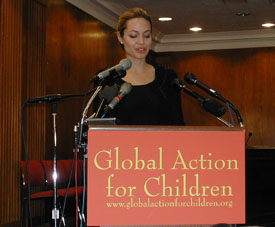Site will be
unavailable for maintenance from June. 4, 11:30 p.m., to June 5, 12:30 a.m. ET. Thank you for your
patience!
For the Good of the Children: Assistance for Orphans and Other Vulnerable Children (OVC)
Posted on 12/07/2005
Editor’s Note: CCF’s Washington office Senior Policy Advisor Mirellise Vazquez was among those visiting U.S. Congress on November 8, 2005 in support of a law aimed at coordinating, implementing and monitoring programs to assist orphans and other vulnerable children (OVC).
The law calls for the U.S. government to provide:
- community-based care and support;
- expanded educational opportunities;
- food security, nutrition and shelter;
- life and job skills;
- psychosocial support;
- inheritance and rights protection;
- social protection systems and child health services, including treatment with life-saving anti-retroviral drugs for HIV-infected children.
 |
Senior Policy Advisor Mirellise Vazquez |
In order to help influence the development of a U.S. government strategy, civil society organizations, including Christian Children’s Fund, came together to develop a comprehensive list of recommendations, which were presented on Capitol Hill.
The following is Vazquez’s account of the event and efforts of actress and activist Angelina Jolie, the day's featured speaker.
On November 17, I attended an event on Capitol Hill, where congressional sponsors of the Orphans and Other Vulnerable Children Act and Angelina Jolie, goodwill ambassador for the U.N. High Commissioner for Refugees (UNHCR), asked U.S. senators and congresspersons to remember the plight of the world's most vulnerable children and fully fund this legislation.
Jolie shared with those in attendance during the event’s question-and-answer session that her newly adopted daughter, Zahara, was orphaned because of AIDS. Watching her daughter's progress, achieved by simply having access to basic food, is what convinced her of the importance of this new law.
 |
| CCF Senior Policy Advisor Mirellise Vazquez attended the event. Actress and activist Angelina Jolie (above) was a featured speaker. |
During the past couple of years, I have been impressed by Jolie’s efforts to raise awareness about the plight of poor and vulnerable children around the world. She has displayed gracefulness and strength when advocating for children’s needs and rights.
Her efforts have made a permanent difference.
What the Numbers Say
The statistics may surprise you:
- According to UNICEF’s State of the World’s Children 2005, there are currently 1 billion children living in poverty worldwide.
- UNICEF and UNAIDS estimate that more than 143 million orphans live in Africa, Latin America, Asia and the Caribbean. Of these, 16 million children have lost both parents, the vast majority of whom died of AIDS.
- The International Labor Organization estimates that 211 million children between age five and 14 work, often in situations that are illegal, hazardous, exploitative or forced.
- The World Health Organization estimates that 11 million children under five years old die annually from preventable or treatable diseases. More than half of these children die from malnutrition.
CCF’s Work with HIV/AIDS-affected Children
CCF uses a seven-point strategy designed to ensure that the organization’s HIV/AIDS programs fully address children's needs.
The strategy emphasizes the following key elements of a comprehensive HIV/AIDS program:
1) Psychosocial support
2) Prevention
3) Home-based care
4) Promotion of positive living for people living with HIV/AIDS
5) Sustainable livelihoods
6) Education
7) Nutrition
The overall goal of CCF programs is to build the capacity of communities to support the healthy development of children by preventing and lessening the impact of HIV/AIDS.
CCF supports programs to prevent and mitigate the impacts of HIV/AIDS in a number of countries, including: Angola, Ethiopia, Senegal, The Gambia, Uganda, Zambia, Belarus, Kenya, Sierra Leone, Thailand and the Ukraine.
In addition, CCF is currently developing an HIV/AIDS strategy for selected high prevalence states in India.
Loading...


